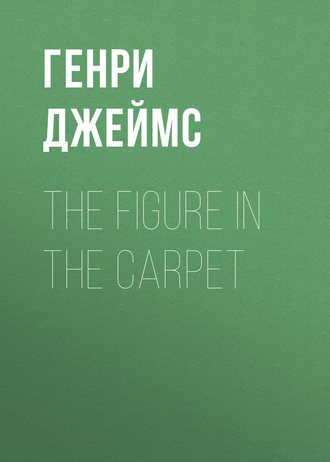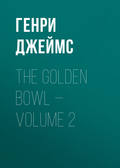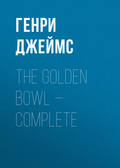
Генри Джеймс
The Figure in the Carpet
CHAPTER IV
Returning to town I feverishly collected them all; I picked out each in its order and held it up to the light. This gave me a maddening month, in the course of which several things took place. One of these, the last, I may as well immediately mention, was that I acted on Vereker’s advice: I renounced my ridiculous attempt. I could really make nothing of the business; it proved a dead loss. After all I had always, as he had himself noted, liked him; and what now occurred was simply that my new intelligence and vain preoccupation damaged my liking. I not only failed to run a general intention to earth, I found myself missing the subordinate intentions I had formerly enjoyed. His books didn’t even remain the charming things they had been for me; the exasperation of my search put me out of conceit of them. Instead of being a pleasure the more they became a resource the less; for from the moment I was unable to follow up the author’s hint I of course felt it a point of honour not to make use professionally of my knowledge of them. I had no knowledge—nobody had any. It was humiliating, but I could bear it—they only annoyed me now. At last they even bored me, and I accounted for my confusion—perversely, I allow—by the idea that Vereker had made a fool of me. The buried treasure was a bad joke, the general intention a monstrous pose.
The great point of it all is, however, that I told George Corvick what had befallen me and that my information had an immense effect upon him. He had at last come back, but so, unfortunately, had Mrs. Erme, and there was as yet, I could see, no question of his nuptials. He was immensely stirred up by the anecdote I had brought from Bridges; it fell in so completely with the sense he had had from the first that there was more in Vereker than met the eye. When I remarked that the eye seemed what the printed page had been expressly invented to meet he immediately accused me of being spiteful because I had been foiled. Our commerce had always that pleasant latitude. The thing Vereker had mentioned to me was exactly the thing he, Corvick, had wanted me to speak of in my review. On my suggesting at last that with the assistance I had now given him he would doubtless be prepared to speak of it himself he admitted freely that before doing this there was more he must understand. What he would have said, had he reviewed the new book, was that there was evidently in the writer’s inmost art something to be understood. I hadn’t so much as hinted at that: no wonder the writer hadn’t been flattered! I asked Corvick what he really considered he meant by his own supersubtlety, and, unmistakeably kindled, he replied: “It isn’t for the vulgar—it isn’t for the vulgar!” He had hold of the tail of something; he would pull hard, pull it right out. He pumped me dry on Vereker’s strange confidence and, pronouncing me the luckiest of mortals, mentioned half a dozen questions he wished to goodness I had had the gumption to put. Yet on the other hand he didn’t want to be told too much—it would spoil the fun of seeing what would come. The failure of my fun was at the moment of our meeting not complete, but I saw it ahead, and Corvick saw that I saw it. I, on my side, saw likewise that one of the first things he would do would be to rush off with my story to Gwendolen.
On the very day after my talk with him I was surprised by the receipt of a note from Hugh Vereker, to whom our encounter at Bridges had been recalled, as he mentioned, by his falling, in a magazine, on some article to which my signature was attached. “I read it with great pleasure,” he wrote, “and remembered under its influence our lively conversation by your bedroom fire. The consequence of this has been that I begin to measure the temerity of my having saddled you with a knowledge that you may find something of a burden. Now that the fit’s over I can’t imagine how I came to be moved so much beyond my wont. I had never before mentioned, no matter in what state of expansion, the fact of my little secret, and I shall never speak of that mystery again. I was accidentally so much more explicit with you than it had ever entered into my game to be, that I find this game—I mean the pleasure of playing it—suffers considerably. In short, if you can understand it, I’ve rather spoiled my sport. I really don’t want to give anybody what I believe you clever young men call the tip. That’s of course a selfish solicitude, and I name it to you for what it may be worth to you. If you’re disposed to humour me don’t repeat my revelation. Think me demented—it’s your right; but don’t tell anybody why.”
The sequel to this communication was that as early on the morrow as I dared I drove straight to Mr. Vereker’s door. He occupied in those years one of the honest old houses in Kensington Square. He received me immediately, and as soon as I came in I saw I hadn’t lost my power to minister to his mirth. He laughed out at sight of my face, which doubtless expressed my perturbation. I had been indiscreet—my compunction was great. “I have told somebody,” I panted, “and I’m sure that person will by this time have told somebody else! It’s a woman, into the bargain.”
“The person you’ve told?”
“No, the other person. I’m quite sure he must have told her.”
“For all the good it will do her—or do me! A woman will never find out.”
“No, but she’ll talk all over the place: she’ll do just what you don’t want.”
Vereker thought a moment, but wasn’t so disconcerted as I had feared: he felt that if the harm was done it only served him right. “It doesn’t matter—don’t worry.”
“I’ll do my best, I promise you, that your talk with me shall go no further.”
“Very good; do what you can.”
“In the meantime,” I pursued, “George Corvick’s possession of the tip may, on his part, really lead to something.”
“That will be a brave day.”
I told him about Corvick’s cleverness, his admiration, the intensity of his interest in my anecdote; and without making too much of the divergence of our respective estimates mentioned that my friend was already of opinion that he saw much further into a certain affair than most people. He was quite as fired as I had been at Bridges. He was moreover in love with the young lady: perhaps the two together would puzzle something out.
Vereker seemed struck with this. “Do you mean they’re to be married?”
“I dare say that’s what it will come to.”
“That may help them,” he conceded, “but we must give them time!”
I spoke of my own renewed assault and confessed my difficulties; whereupon he repeated his former advice: “Give it up, give it up!” He evidently didn’t think me intellectually equipped for the adventure. I stayed half an hour, and he was most good-natured, but I couldn’t help pronouncing him a man of unstable moods. He had been free with me in a mood, he had repented in a mood, and now in a mood he had turned indifferent. This general levity helped me to believe that, so far as the subject of the tip went, there wasn’t much in it. I contrived however to make him answer a few more questions about it, though he did so with visible impatience. For himself, beyond doubt, the thing we were all so blank about was vividly there. It was something, I guessed, in the primal plan, something like a complex figure in a Persian carpet. He highly approved of this image when I used it, and he used another himself. “It’s the very string,” he said, “that my pearls are strung on!” The reason of his note to me had been that he really didn’t want to give us a grain of succour—our density was a thing too perfect in its way to touch. He had formed the habit of depending on it, and if the spell was to break it must break by some force of its own. He comes back to me from that last occasion—for I was never to speak to him again—as a man with some safe preserve for sport. I wondered as I walked away where he had got his tip.
CHAPTER V
When I spoke to George Corvick of the caution I had received he made me feel that any doubt of his delicacy would be almost an insult. He had instantly told Gwendolen, but Gwendolen’s ardent response was in itself a pledge of discretion. The question would now absorb them and would offer them a pastime too precious to be shared with the crowd. They appeared to have caught instinctively at Vereker’s high idea of enjoyment. Their intellectual pride, however, was not such as to make them indifferent to any further light I might throw on the affair they had in hand. They were indeed of the “artistic temperament,” and I was freshly struck with my colleague’s power to excite himself over a question of art. He’d call it letters, he’d call it life, but it was all one thing. In what he said I now seemed to understand that he spoke equally for Gwendolen, to whom, as soon as Mrs. Erme was sufficiently better to allow her a little leisure, he made a point of introducing me. I remember our going together one Sunday in August to a huddled house in Chelsea, and my renewed envy of Corvick’s possession of a friend who had some light to mingle with his own. He could say things to her that I could never say to him. She had indeed no sense of humour and, with her pretty way of holding her head on one side, was one of those persons whom you want, as the phrase is, to shake, but who have learnt Hungarian by themselves. She conversed perhaps in Hungarian with Corvick; she had remarkably little English for his friend. Corvick afterwards told me that I had chilled her by my apparent indisposition to oblige them with the detail of what Vereker had said to me. I allowed that I felt I had given thought enough to that indication: hadn’t I even made up my mind that it was vain and would lead nowhere? The importance they attached to it was irritating and quite envenomed my doubts.
That statement looks unamiable, and what probably happened was that I felt humiliated at seeing other persons deeply beguiled by an experiment that had brought me only chagrin. I was out in the cold while, by the evening fire, under the lamp, they followed the chase for which I myself had sounded the horn. They did as I had done, only more deliberately and sociably—they went over their author from the beginning. There was no hurry, Corvick said the future was before them and the fascination could only grow; they would take him page by page, as they would take one of the classics, inhale him in slow draughts and let him sink all the way in. They would scarce have got so wound up, I think, if they hadn’t been in love: poor Vereker’s inner meaning gave them endless occasion to put and to keep their young heads together. None the less it represented the kind of problem for which Corvick had a special aptitude, drew out the particular pointed patience of which, had he lived, he would have given more striking and, it is to be hoped, more fruitful examples. He at least was, in Vereker’s words, a little demon of subtlety. We had begun by disputing, but I soon saw that without my stirring a finger his infatuation would have its bad hours. He would bound off on false scents as I had done—he would clap his hands over new lights and see them blown out by the wind of the turned page. He was like nothing, I told him, but the maniacs who embrace some bedlamitical theory of the cryptic character of Shakespeare. To this he replied that if we had had Shakespeare’s own word for his being cryptic he would at once have accepted it. The case there was altogether different—we had nothing but the word of Mr. Snooks. I returned that I was stupefied to see him attach such importance even to the word of Mr. Vereker. He wanted thereupon to know if I treated Mr. Vereker’s word as a lie. I wasn’t perhaps prepared, in my unhappy rebound, to go so far as that, but I insisted that till the contrary was proved I should view it as too fond an imagination. I didn’t, I confess, say—I didn’t at that time quite know—all I felt. Deep down, as Miss Erme would have said, I was uneasy, I was expectant. At the core of my disconcerted state—for my wonted curiosity lived in its ashes—was the sharpness of a sense that Corvick would at last probably come out somewhere. He made, in defence of his credulity, a great point of the fact that from of old, in his study of this genius, he had caught whiffs and hints of he didn’t know what, faint wandering notes of a hidden music. That was just the rarity, that was the charm: it fitted so perfectly into what I reported.
If I returned on several occasions to the little house in Chelsea I dare say it was as much for news of Vereker as for news of Miss Erme’s ailing parent. The hours spent there by Corvick were present to my fancy as those of a chessplayer bent with a silent scowl, all the lamplit winter, over his board and his moves. As my imagination filled it out the picture held me fast. On the other side of the table was a ghostlier form, the faint figure of an antagonist good-humouredly but a little wearily secure—an antagonist who leaned back in his chair with his hands in his pockets and a smile on his fine clear face. Close to Corvick, behind him, was a girl who had begun to strike me as pale and wasted and even, on more familiar view, as rather handsome, and who rested on his shoulder and hung on his moves. He would take up a chessman and hold it poised a while over one of the little squares, and then would put it back in its place with a long sigh of disappointment. The young lady, at this, would slightly but uneasily shift her position and look across, very hard, very long, very strangely, at their dim participant. I had asked them at an early stage of the business if it mightn’t contribute to their success to have some closer communication with him. The special circumstances would surely be held to have given me a right to introduce them. Corvick immediately replied that he had no wish to approach the altar before he had prepared the sacrifice. He quite agreed with our friend both as to the delight and as to the honour of the chase—he would bring down the animal with his own rifle. When I asked him if Miss Erme were as keen a shot he said after thinking: “No, I’m ashamed to say she wants to set a trap. She’d give anything to see him; she says she requires another tip. She’s really quite morbid about it. But she must play fair—she shan’t see him!” he emphatically added. I wondered if they hadn’t even quarrelled a little on the subject—a suspicion not corrected by the way he more than once exclaimed to me: “She’s quite incredibly literary, you know—quite fantastically!” I remember his saying of her that she felt in italics and thought in capitals. “Oh when I’ve run him to earth,” he also said, “then, you know, I shall knock at his door. Rather—I beg you to believe. I’ll have it from his own lips: ‘Right you are, my boy; you’ve done it this time!’ He shall crown me victor—with the critical laurel.”







